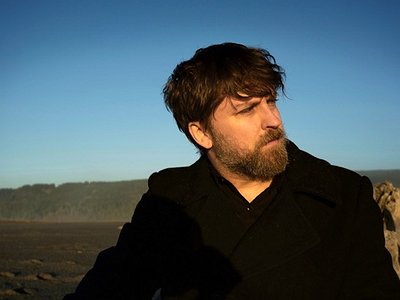Part 2
The relationship between music and other forms of art – painting, video art and cinema most importantly - has become increasingly important. How do you see this relationship yourself and in how far, do you feel, does music relate to other senses than hearing alone?
I’m fairly ignorant of other art forms. It’s not something I’m proud of. I’m not very cultured. In my limited experience, things of that nature work best when one of the arts in the given relationship is not used as a resource, but instead, all of the arts in the given piece work with each other. For instance, if a movie just grabs some song that has a proven record of meaning something to other people and plants that song in the middle of some scene knowing full well the power of that song, it isn’t very exciting to me. More and more, it seems to me people think of music as a resource. You can see it in ads for music services where music is advertised as being useful for working out, or driving, or even providing a soundtrack to the times of your lives. Of course I like to use music for things as well so I’m not saying that every bit of music needs to be listened to with full attention, but it does seem that advertising has pushed the idea that music is merely there to be used and not listened to as its own experience.
There seem to be two fundamental tendencies in music today: On the one hand, a move towards complete virtualisation, where tracks and albums are merely released as digital files. And, on the other, an even closer union between music, artwork, packaging and physical presentation. Where do you stand between these poles?
I tend not to think of digital music as virtualisation. I think the virtual music would be the realm of possibilities before any music was actualised. So for me, even if music is in 1s and 0s, it is still physical in its own way. I mean, it’s not a spiritual substance that can’t be measured by science, right? I apologise if this seems like an annoying and pedantic thought, but it has a purpose. If we see both as actual, than we don’t see each as opposed to each other, but rather, perhaps both types of presentation are merely opposite ends of the same spectrum. I don’t see either way as being really superior to the other, even if I tend to be more attracted to the formats that I grew up with. That is a cultural thing. I think all formats offer possibilities and difficulties and the exciting thing for me is to see an artist think in new ways about the types of formats that are available, or even just to take full advantage of the given format.
The role of an artist is always subject to change. What's your view on the (e.g. political/social/creative) tasks of artists today and how do you try to meet these goals in your work?
That’s a good question. I think today a lot of artists are asking themselves the same question. I think every artist has to ask themselves what their own role is and I don’t think there is one answer for everyone.
Music-sharing sites and -blogs as well as a flood of releases in general are presenting both listeners and artists with challenging questions. What's your view on the value of music today? In what way does the abundance of music change our perception of it?
It doesn’t change my perception of music. I think the meaning of music may shift in general, but that is probably different from person to person. I wouldn’t assume to know how people would listen to music or what it would mean to individuals but I would imagine there are infinite meanings. I think I know what this question is getting at, but it would be hard for me to answer due to being in the world of making music and I am afraid any answer I would give would paint me as Grandpa Simpson shaking my fist at the clouds. Instead, I think it is best to think of all the possibilities that new worlds can afford us, and that includes with new technology. That doesn’t mean I believe in “progress” when it comes to these things, but I’m not a traditionalist either. I tend to think of the world in flux and for the musician as well as the listener, it’s a positive thing to think of the positive possibilities such a flux affords.
How, would you say, could non-mainstream forms of music reach wider audiences?
I think the term “non-mainstream forms of music” might mean a lot of different things to different people. Do those forms even want to be heard by wider audiences? Is that their goal? If not, would they or should they be concerned with it? I would consider myself non-mainstream but I know a lot of folks in the underground who would consider my music very mainstream. I think that term is relative. With the different streaming services available, it would be hard not to have one’s music available to have someone hear it.
Usually, it is considered that it is the job of the artist to win over an audience. But listening is also an active, rather than just a passive process. How do you see the role of the listener in the musical communication process?
I don’t agree with the idea that it is the job of an artist to win over an audience. I think that plays into the idea that the more popular a band is, they better they must be at making music, which we all know is incorrect. This question, and the one before, seems to presuppose that an artist’s main goal is to acquire listeners. For many, that may be true, but it is not true for all. Certainly, one may enjoy acquiring listeners without having it being the main goal in creating music. I’m not saying that I think a musician should shun people listening to their music. I just don’t think that needs to be the goal of every band or musician.
Reaching audiences usually involves reaching out to the press and possibly working with a PR company. What's your perspective on the promo system? In which way do music journalism and PR companies change the way music is perceived by the public?
It’s just my opinion, but I think publicity, image, desire and propaganda are intimately related. My thoughts on this subject tend to be influenced by Ioan Couliano, who was assassinated, so he must have been on to something.






